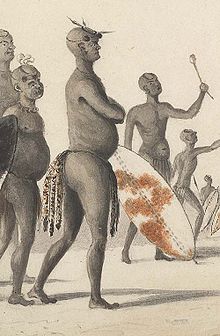Mzilikazi

Mzilikazi (German about: "The Great Road") (* around 1790 in Mkuze , Zululand ; † September 9, 1868 in Ingama near Bulawayo , Matabeleland ) was a king in southern Africa who founded the Kingdom of the Matabele in the area of today's Zimbabwe was. Previously, he was one of the main actors in the Mfecane , a time of displacement and famine.
Life
Mzilikazi was a son of Matshobana KaMangete (around 1790 - around 1820) and his first wife Nompethu KaZwide, who was a daughter of the Ndwandwe leader Zwide kaLanga . Zwide kaLanga had waged war against Matshobana's tribe Khumalo and had him killed. Mzilikazi was initially subordinate to Zwide's enemy, the Zulu chief Shaka , but in 1823 there was a rift with Shaka and he rebelled. One reason was resistance to the forced celibacy introduced by Shaka . Since Mzilikazi had to reckon with his ritual execution, he fled with his tribe first northwards to Mozambique, then in 1826 to the Highveld in the later Transvaal . On his march he oppressed numerous ethnic groups, including the Basotho and Barolong , and integrated many of them into his people. In 1830 he defeated the troops of Shaka's successor Dingane on the Sand River . He also met armed Koranna , Griqua and Boers . Its headquarters were north of the Magaliesberg near today's Pretoria ; Another fortress was Mosega near today's Zeerust . Boer commandos under Louis Trichardt and Andries Hendrik Potgieter attacked him in 1836 and 1837 with varying degrees of success, so that Mzilikazi moved from there west to what is now Botswana and then north to what is now Zambia . However, Mzilikazi did not succeed in crossing the Zambezi permanently and defeating the local Kololo , who themselves had fled Shaka in 1835. Mzilikazi moved south again to what is now Matabeleland , where he finally settled in 1840. Before that, another group of the Matabele under his son had conquered the Shona of the former Monomotopa Empire and made it serfs .
In Matabeleland, Mzilikazi organized his tribes into a system of regimental kraals , similar to the one in the Zulu Empire.
Mzilikazi showed a generally friendly attitude towards the whites. One of his friends was the Scottish missionary Robert Moffat , who ran a mission station in Kuruman . He had met Moffat in 1830 and had been visited by him several times until 1859. Other whites came to Matabeleland with the missionaries. When they discovered gold there in 1865, they were followed by numerous white settlers who Mzilikazi could no longer control, which apparently led to the fall of his kingdom under his son and successor Lobengula .
reception
Mzilikazi's contemporary David Livingstone described Mzilikazi as the second most impressive political leader in Africa he met there.
Web links
- Portrait at sahistory.org.za (English)
Individual evidence
- ↑ a b c d e f g h i j portrait at sahistory.org.za (English), accessed on February 23, 2014
- ↑ a b c d e Joseph Ki-Zerbo : The history of black Africa. Fischer, Frankfurt am Main 1981, ISBN 3-596-26417-0 , p. 288.
| personal data | |
|---|---|
| SURNAME | Mzilikazi |
| ALTERNATIVE NAMES | Mzilikasi |
| BRIEF DESCRIPTION | King of Southern Africa (Kingdom of Matabele) |
| DATE OF BIRTH | around 1790 |
| PLACE OF BIRTH | Mkuze, Zululand |
| DATE OF DEATH | September 9, 1868 |
| Place of death | Ingama at Bulawayo , Matabeleland |